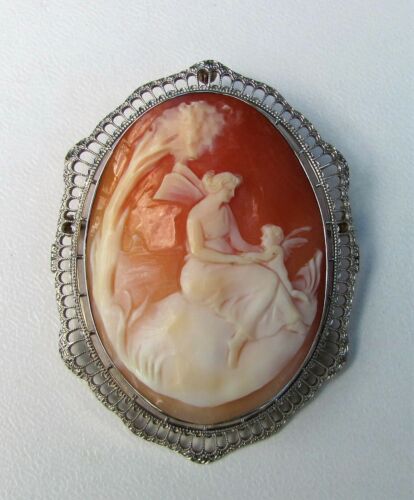-40%
Antique Edwardian 10K Shell Cameo Brooch Pendant Circa 1910
$ 277.2
- Description
- Size Guide
Description
Antique Edwardian 10K Shell Cameo Brooch Pendant Circa 1910Antique Edwardian 10K Shell Cameo Brooch Pendant Circa 1910
A fine late Edwardian shell cameo set in a 10k white gold filigree frame (stamped and tested), dating from the early 20th century, circa 1910-1920. The cameo depicts Psyche and Cupid, though normally, Cupid is depicted as a man rather than a child, because it is a love story. See below for a brief synopsis of the story of Cupid and Psyche. The brooch is 2 1/4" by 1 3/4". It has the original lever clasp and a drop down bail for wearing as a pendant. In excellent condition and guaranteed to be as described.
Cupid and Psyche
is a story originally from
Metamorphoses
(also called
The Golden Ass
), written in the 2nd century AD by Lucius
Apuleius
Madaurensis (or Platonicus).
[2]
The tale concerns the overcoming of obstacles to the
love
between
Psyche
(
/
ˈsaɪkiː
/
,
Greek
: Ψυχή
[psyː.kʰɛ᷄ː]
, "Soul" or "Breath of Life") and
Cupid
(Latin
Cupido,
"Desire") or Amor ("Love", Greek
Eros
’′Ερως), and their ultimate union in a
sacred marriage
. Although the only extended narrative from
antiquity
is that of Apuleius from 2nd century AD, Eros and Psyche appear in
Greek art
as early as the 4th century BC. The story's
Neoplatonic
elements and allusions to
mystery religions
accommodate multiple interpretations,
[3]
and it has been analyzed as an
allegory
and in light of
folktale
,
Märchen
or
fairy tale
, and
myth
.
[4]
Since the rediscovery of Apuleius's novel in the
Renaissance
, the
reception
of
Cupid and Psyche
in the
classical tradition
has been extensive. The story has been retold in poetry, drama, and opera, and depicted widely in painting, sculpture, and even wallpaper.
[5]
Though Psyche is usually referred to in Roman mythology by her Greek name, her Roman name through direct translation is Anima.
Source: Wikipedia
Click to edit text
Listing and template services provided by inkFrog













